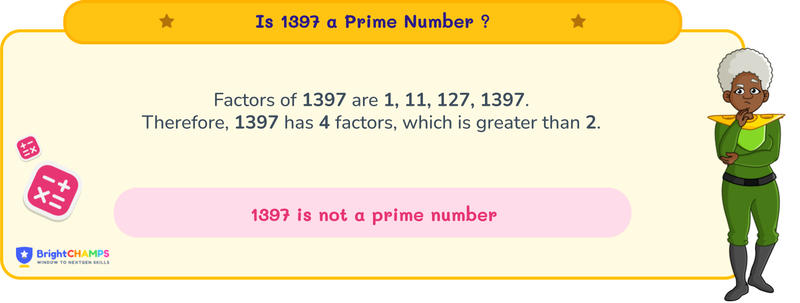Summarize this article:
 209 Learners
209 LearnersLast updated on August 5, 2025
Is 1397 a Prime Number?

The numbers that have only two factors, which are 1 and themselves, are called prime numbers. Prime numbers play a crucial role in encryption, computer algorithms, and various mathematical applications. In this topic, we will be discussing whether 1397 is a prime number or not.

Is 1397 a Prime Number?
Numbers can primarily be classified as prime or composite based on their factors.
A prime number is a natural number greater than 1 that is only divisible by 1 and itself. For instance, 3 is a prime number because it is divisible by only 1 and 3.
A composite number has more than two factors. For example, 6 is a composite number because it is divisible by 1, 2, 3, and 6. Some properties of prime numbers include: Prime numbers are greater than 1. 2 is the only even prime number. Prime numbers have only two factors: 1 and the number itself. Any two distinct prime numbers are co-prime, as they only share 1 as a common factor.
To determine if 1397 is a prime number, we must check its number of divisors.


Why is 1397 a Prime Number?
A prime number has exactly two divisors: 1 and itself. To ascertain whether 1397 is a prime, we need to verify that it has no divisors other than 1 and 1397. Some methods to differentiate between prime and composite numbers include:
- Counting Divisors Method
- Divisibility Test
- Prime Number Chart
- Prime Factorization

Using the Counting Divisors Method
The counting divisors method involves counting all the divisors of a number to determine if it's prime or composite. If there are exactly 2 divisors, the number is prime. If there are more than 2 divisors, the number is composite. Let's verify if 1397 is prime:
Step 1: Every number is divisible by 1 and itself.
Step 2: Check divisibility from 2 up to the square root of 1397. Since 1397 is not divisible by any number other than 1 and itself, it is a prime number.
Explore Our Programs



Using the Divisibility Test Method
The divisibility test method involves using rules to check if a number is divisible by another number without a remainder.
Divisibility by 2: 1397 is odd, hence not divisible by 2.
Divisibility by 3: The sum of the digits (1 + 3 + 9 + 7 = 20) is not divisible by 3.
Divisibility by 5: The last digit is not 0 or 5, so it's not divisible by 5.
Further divisibility tests for other numbers up to the square root of 1397 confirm that 1397 is not divisible by any smaller prime number other than 1 and itself.
As 1397 is not divisible by any number other than 1 and 1397, it is indeed a prime number.

Using Prime Number Chart
A prime number chart, often created using the Sieve of Eratosthenes method, helps identify prime numbers up to a certain limit.
Step 1: List numbers from 1 to 1000.
Step 2: Cross out multiples of each prime starting from 2.
Step 3: Continue this process up to the square root of the largest number in your list. In a detailed chart, 1397 would not have been crossed out, indicating its primality.

Using the Prime Factorization Method
Prime factorization involves breaking down a number into its prime components.
Step 1: Attempt to divide 1397 by the smallest prime numbers.
Step 2: If no division yields a whole number other than 1 and 1397, it confirms that 1397 is a prime number. 1397 cannot be factorized into smaller prime numbers beyond 1 and itself, verifying its status as a prime number.

Common Mistakes to Avoid When Determining if 1397 is a Prime Number
When learning about prime numbers, misconceptions might occur. Here are some common mistakes to avoid:

FAQ on is 1397 a Prime Number?
1.Is 1397 a perfect square?
2.What is the sum of the divisors of 1397?
3.What are the factors of 1397?
4.What are the closest prime numbers to 1397?
5.What is the prime factorization of 1397?

Important Glossaries for "Is 1397 a Prime Number"
- Prime numbers: Natural numbers greater than 1 that have no divisors other than 1 and themselves.
- Composite numbers: Natural numbers greater than 1 that are divisible by more than two numbers.
- Divisibility: A number is divisible by another if the division results in an integer without a remainder.
- Prime factorization: Expressing a number as a product of its prime factors.
- Co-prime numbers: Two numbers that have no common factors other than 1.



Hiralee Lalitkumar Makwana
About the Author
Hiralee Lalitkumar Makwana has almost two years of teaching experience. She is a number ninja as she loves numbers. Her interest in numbers can be seen in the way she cracks math puzzles and hidden patterns.
Fun Fact
: She loves to read number jokes and games.

















